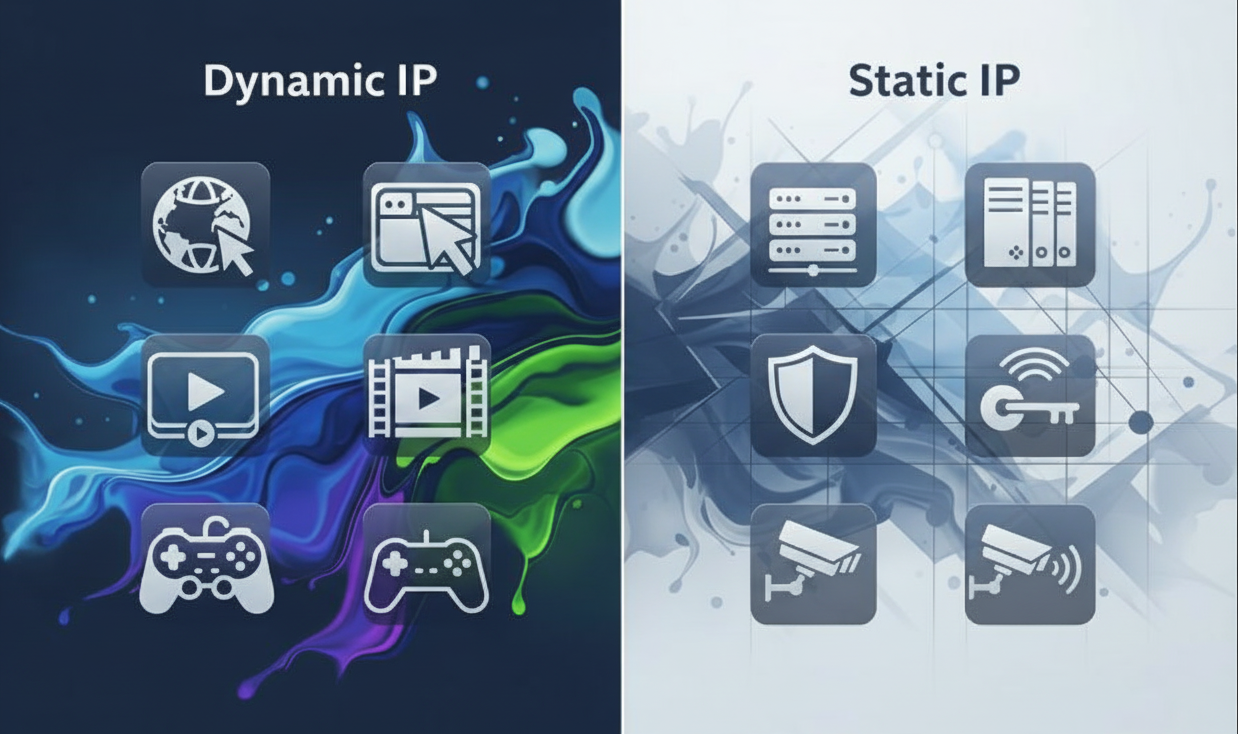Every device connected to the internet needs a unique identifier to send and receive information. This identifier is its IP (Internet Protocol) address, functioning much like a street address for your home in the physical world. Without it, data wouldn’t know where to go. But not all IP addresses are created equal. They primarily come in two flavors: static ip and dynamic ip. For the average internet user, this distinction might seem technical and unimportant. However, for digital marketers, MMO players, and businesses, understanding the difference between a static vs. dynamic IP is crucial for security, reliability, and performance. This article will break down what each type is, their pros and cons, and help you determine which one is right for your specific needs.
1. Understanding Dynamic IP Addresses: The Default Choice
A dynamic IP address is a temporary address assigned to a device each time it connects to the network. Internet Service Providers (ISPs) typically assign these by default to their residential customers. Think of it like being assigned a temporary locker at a gym; you get one from an available pool, and the next time you visit, you might get a different one.
When you connect your router to the internet, your ISP’s DHCP (Dynamic Host Configuration Protocol) server automatically assigns an available IP address from its pool. This address remains with you for a certain period (a “lease”) or until you restart your router. When the lease expires or the router reboots, the ISP may assign you a completely new IP address.

1.1. Advantages of a Dynamic IP Address
- Cost-Effective for ISPs: For providers, managing a large pool of dynamic IPs is more efficient and cheaper than assigning a unique, permanent address to every customer. They only need enough IPs for the number of users online at any given time, not for every single subscriber. This cost-saving is passed on to the consumer.
- Ease of Use and Automation: There is no setup required from the user’s end. It’s a plug-and-play system. Your devices automatically receive an IP address, making network configuration seamless for non-technical users.
- Enhanced Security (for the average user): Because your IP address changes periodically, it makes it slightly more difficult for malicious actors to target your network directly over a long period. A changing address is a moving target.
1.2. Disadvantages of a Dynamic IP Address
- Unreliable for Hosting: If you want to host a website, game server, or email server, a dynamic IP is a poor choice. Domain Name Systems (DNS) link a domain name (like genfarmer.com) to an IP address. If that IP address changes, the DNS record becomes outdated, and users can no longer find your server.
- Complicates Remote Access: Accessing your home network, security cameras, or a remote desktop becomes a challenge. Each time the IP changes, you would need to find out the new address to connect, which is highly impractical.
- Potential Geolocation Issues: Some services rely on your IP address to determine your location. A changing IP could lead to inconsistencies in location-based services or trigger security alerts on some platforms.
2. Understanding Static IP Addresses: The Permanent Solution
A static IP address, as the name implies, is a fixed, unchanging address. Once assigned to your device or network, it remains the same unless you manually change it or switch ISPs. This is akin to having a permanent, registered street address for your house. Getting a static IP address typically requires a specific request to your ISP and often comes with an additional monthly fee.

2.1. Advantages of a Static IP Address
- Superior Hosting Reliability: This is the number one reason to get a static IP. It provides a stable, permanent address for DNS records, ensuring that your website, email, or game server is always accessible to users around the world.
- Seamless Remote Access: With a static IP, you can reliably connect to your office or home network from anywhere. This is essential for businesses using Virtual Private Networks (VPNs) or for individuals who need consistent access to files or devices like security cameras and IoT hardware.
- More Stable for VoIP and Gaming: Voice over IP (VoIP) services and certain online games perform better with a static IP. It simplifies port forwarding, which is often required to host game sessions or ensure a stable connection.
- Predictable Geolocation: Services that use your IP for location verification will work more consistently.
2.2. Disadvantages of a Static IP Address
- Higher Cost: ISPs charge a premium for static IPs because their supply is finite. This is an added operational cost for businesses or power users.
- Increased Security Risk: A fixed IP address presents a constant, stationary target for hackers. It’s easier for them to profile and launch sustained attacks against your network. Therefore, using a static IP necessitates more robust security measures, such as a well-configured firewall and intrusion detection systems.
- Manual Configuration: While not overly complex, setting up a static IP may require more hands-on configuration compared to the automatic nature of dynamic IPs.
3. Static vs. Dynamic IP: A Head-to-Head Comparison
| Feature | Dynamic IP | Static IP |
|---|---|---|
| Definition | An IP address that changes periodically. | A fixed, permanent IP address. |
| Cost | Included in standard internet packages. | Typically requires an additional monthly fee. |
| Setup | Automatic and plug-and-play. | May require manual configuration. |
| Reliability | Less reliable for hosting and remote access. | Highly reliable and stable for all services. |
| Security | Slightly more secure for casual users due to its changing nature. | A higher security risk as it provides a fixed target. Requires strong security measures. |
| Best For | General home internet use: browsing, streaming, casual gaming. | Businesses, hosting servers (web, email, game), reliable remote access, advanced networking. |
4. Choosing the Right IP: Dynamic vs. Static Use Cases
The choice between a dynamic and static IP address isn’t about which is “better,” but which is right for your specific needs. Here’s a practical guide to help you decide.

4.1. When to Use a Dynamic IP Address (The Default Choice)
For the vast majority of internet users, a dynamic IP is the perfect solution. It’s automatically assigned by your provider and works flawlessly for everyday online activities. You should stick with a dynamic IP if your main activities include:
- General Browsing & Streaming: Watching Netflix, YouTube, scrolling social media, and reading websites.
- Online Gaming (as a Player): Connecting to game servers to play with friends and others online.
- Standard Communication: Sending emails, using messaging apps like WhatsApp or Telegram, and making video calls.
In short, if you only need to access information and services on the internet, a dynamic IP is all you need.
4.2. When You Absolutely Need a Static IP Address (The Professional Choice)
A static IP provides a fixed, unchanging address. It’s essential when you need others to reliably connect to you over the internet. You must use a static IP for the following scenarios:
4.2.1. Hosting Your Own Servers
If your network is the source of a service, its address cannot change. This includes:
- Web Servers: To ensure your website’s domain name always points to your server.
- Email or FTP Servers: For reliable mail delivery and file access.
- Game Servers: So players can consistently find and connect to your game world.
4.2.2. Reliable Remote Access
To connect to your home or office network from anywhere without fail, a static IP is crucial:
- Business VPNs: Allowing employees to securely connect to the company’s internal network.
- Remote Desktop Software: To reliably log in to your work or home computer from another location.
- Security Cameras & IoT: For consistent monitoring and control of your smart devices.
4.2.3. Advanced & Business-Critical Tasks
For professionals and power users, a static IP offers stability for specific functions:
- IP Whitelisting: Accessing secure systems that only permit connections from pre-approved IP addresses.
- Stable Port Forwarding: Ensuring consistent performance for certain online games and P2P applications.
Conclusion: Making the Right Choice for Your Needs
The static vs. dynamic IP debate ultimately comes down to your specific use case. For the vast majority of internet users, a dynamic IP is the practical, cost-effective, and secure choice that works seamlessly in the background. However, for businesses, developers, and power users who demand reliability for hosting, remote access, and advanced networking, a static IP is an indispensable tool.
At GenFarmer, we understand that sophisticated digital operations, from large-scale social media marketing to MMO automation, require robust and intelligent infrastructure. Managing hundreds of accounts means managing hundreds of digital identities, where IP control is paramount. Our ecosystem is built to address these challenges head-on. Whether you need the physical control of a Box Phone Farm, the flexibility of Cloud Phones, or the advanced networking capabilities of our Router Proxy hardware, we provide the tools to manage your digital footprint effectively. Explore our automation solutions like GenFarmer Trust and GenFarmer TikTok Boost to see how our technology can empower your projects and scale your success.











